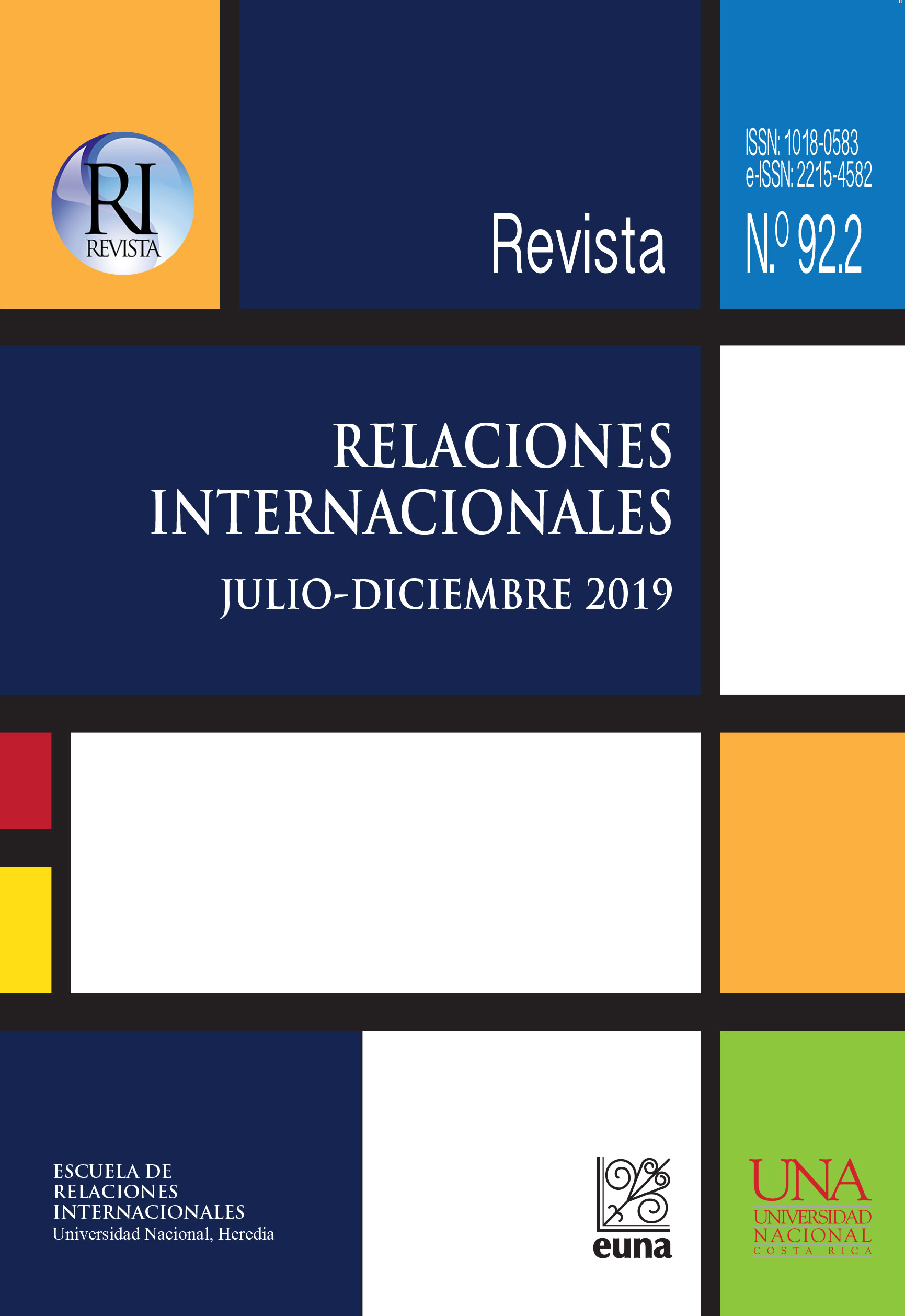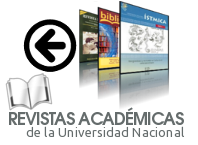Political economy of fair trade and development theory: implications in the Costa Rican coffee market (1990-2017)
DOI:
https://doi.org/10.15359/ri.92-2.1Palabras clave:
Desarrollo, Dependencia, Teorías, Comercio Justo, Costa Rica, CaféResumen
Con respecto de sus fundamentos, las iniciativas del comercio justo experimentaron una metamorfosis entre la década de 1940 y finales de la década de 1980. A través de las escuelas de pensamiento icónicas de la dependencia y del "desarrollo del subdesarrollo", la evolución de la teoría del desarrollo ha formado los principios y supuestos del comercio justo. A pesar de que estas escuelas de pensamiento cuestionan los supuestos de los mercados neoliberales, su intención de cambiar el sistema de comercio mundial y su intercambio desigual fue el resultado de una aplicación limitada de las relaciones sociales de producción en lugar de las relaciones económicas de intercambio. Estos factores, además del papel declinante del Estado en el desarrollo a finales de la década de 1980, el colapso de la Unión Soviética, y la contrarrevolución neoliberal a inicios de la década de 1990, llevaron al movimiento del comercio justo a redireccionar su enfoque.
El resurgimiento de las fuerzas neoliberales a inicios de la década de 1990, llevó a la red del comercio justo (lo que quedó del movimiento originado en la década de 1940) a implementar estrategias amigables con la filosofía de mercado para posicionarse mejor dentro del mercado dominante internacionalmente. A pesar de que la revolución neoliberal llevó al renacimiento de la red de comercio justo, esto no significa que la red haya perdido su sentido original de precios justos e intercambio justo, o su lealtad a los países del Sur Global. Su nueva realidad es prometedora, pero su nueva “dependencia” en enfoques amigables con el mercado puede también moldear su raison d’être.
Referencias
Amin, S. (1974). Accumulation on a world scale: a critique of the theory of underdevelopment. Monthly Review Press, vol. 2. Retrieved from https://monthlyreview.org/product/accumulation_on_a_world_scale/
Bacon, C. (2004). Confronting the coffee crisis: can fair trade, organic and specialty coffees reduce small-scale farmer vulnerability in Northern Nicaragua? Science Direct, 33:497511.
Baran, P. (1957). The political economy of growth. United States: Monthly Review Press. New York: John Calder Publishers.
Baran, P. & Sweezy, P. (1966). Monopoly capital: an essay on the American economic and social order. New York: Monthly Review Press.
Barratt Brown, M. (1993). Fair trade: reform and realities in the international trading system. London, England: Zed Books.
Cardoso, F. (July- August 1972). Dependent capitalist development in Latin America, New Left Review. London. Retrieved from https://newleftreview.org/issues/I74
Cardoso, F. & Faletto, E. (1979). Dependency and development in Latin America. Los Angeles, United States: University of California Press.
Cypher, J. & Dietz, J. (1997). The Process of economic development. London, England: Routledge, p. 169-197.
Ehrlich, S. (2018). The Politics of fair trade: moving beyond free trade and protection. New York, United States: Oxford University Press.
Fairtrade Labelling Organizations International -FLO- (reports from 2009, 2010, 2011, 2012, 2013,2014, 2015, 2016 and 2017). The Benefits of Fairtrade: A Monitoring and Evaluation Report of Fairtrade Certified Producer Organisations for 2008 (2nd ed.). Bonn, Germany. Retrieved from https://monitoringreport2016.fairtrade.net/en/
Frank, A. G. (1969). Latin America: underdevelopment or revolution. Essays on the development of underdevelopment and the immediate enemy. New York, United States: Monthly Review Press.
Fridell, G. (2007). Fair trade coffee: The prospects and pitfalls of market-driven social justice. Toronto, Canada: University of Toronto Press.
Giovannucci, D. & Koekoek, F. (2003). The state of sustainable coffee: a study of the northern twelve major markets. London, England: International Coffee Organization.
Helleiner, E. (1994). States and the reemergence of global finance: from Bretton Woods to the 1990s. New York, United States: Cornell University Press.
International Coffee Organization (2018). NY coffee prices Database. Retrieved from http://www.ico.org/
International Coffee Organization. ICO annual reviews 2011/2012, 2012/2013, 2013/2014, 2014/2015, 2016/2017 retrospective. Retrieved from http://www.ico.org/documents/cy2012-13/annual-review-2011-12e.pdf
Lewin, B.; Giovannuci, D.; & Varangis, P. (2004). Coffee markets: new paradigms in global supply and demand. (The International Bank for Reconstruction and Development, Agriculture and Rural Development, Discussion Paper 3), Washington: World Bank. Retrieved from https://www.scirp.org/(S(lz5mqp453edsnp55rrgjct55))/reference/ReferencesPapers.aspx?ReferenceID=2039966
Paré, G.; Trudel, M.C.; Jaana, M.; & Kitsiou, S. (2015). Synthesizing information systems knowledge: a typology of literature reviews. Information & Management. 52 (2): 183–199. Retrieved from https://edisciplinas.usp.br/pluginfile.php/4126344/mod_resource/content/2/2.4.Pare%20et%20al.%202015%20-%20literature%20review.pdf
Prebisch, R. (1950). The Economic Development of Latin America and its Principal Problems. New York: Economic Commission for Latin America. Retrieved from https://repositorio.cepal.org/bitstream/handle/11362/29973/002_en.pdf?sequence=1&isAllowed=y
Raynolds, L. T. (2000). Re-embedding global agriculture: the international organic and fair trade movements. Agriculture and Human Values, 17(3), 297-309, Retrieved from https://link.springer.com/article/10.1023/A:1007608805843
Redfern, A. & Snedker, P. (2002). Creating market opportunities for small enterprises: experiences of the fair trade movement. Geneva, Switzerland: International Labor Organization. Retrieved from http://www.oit.org/wcmsp5/groups/public/---ed_emp/---emp_ent/ ifp_seed/documents/publication/wcms_117707.pdf
Reinecke, J. (2010). Beyond a subjective theory of value and towards a 'fair price': an organizational perspective on Fairtrade minimum price setting. Organization, 17(5), 563–581. Retrieved from http://www.socioeco.org/bdf_fiche-document-3384_en.html
Reinecke, J.; Manning, S.; & von Hagen, O. (2012), The emergence of a standards market: multiplicity of sustainability standards in the global coffee industry, organization studies, 33(5), 6, 789-812. Retrieved from https://ssrn.com/abstract=1970343
Renard, M. (January 2003). Fair trade: quality, market and conventions. Journal of Rural Studies 19(1):87-96.
Ruggie, J. (1982). International regimes, transactions, and change: embedded liberalism in the postwar economic order, international organization. Volume 36, Issue 2, International Regimes, p. 379-415. Retrieved from http://ftp.columbia.edu/itc/sipa/U6800/readings-sm/rug_ocr.pdf
Singer, H. (1950). The distribution of gains between investing and borrowing Countries, American Economic Review 40: 473-85.
Singer, H. (1984). "The terms of trade controversy and the evolution of soft financing: early years and the UN", pp. 275-303 in Gerald Meier and Dudley Seers (eds), Pioneers in Development. Oxford: Oxford University Press.
Singer, H. (1989). Terms of trade and economic development, pp. 323-8 in John Eatwell et al. The New Palgrave: Economic Development. New York: W. W. Norton.
United Nations (1949). Relative prices of exports and imports of underdeveloped countries. New York: United Nations. Retrieved from www.questia.com
VanderHoff Boersma, F. (2001). “Economía y Reino de Dios: neoliberalismo y dignidad opuestos que viven juntos”. Christus 723.
Descargas
Publicado
Cómo citar
Número
Sección
Licencia
Esta publicación está adscrita a Creative Commons; deben respetarse sus atribuciones y restricciones.
Los autores/as que publiquen en esta revista aceptan las siguientes condiciones:
- Los autores/as conservan los derechos de autor y ceden a la revista el derecho de la primera publicación, con el trabajo registrado con la Licencia Creative Commons Atribución-NoComercial-CompartirIgual 4.0 Internacional, que permite a terceros utilizar lo publicado siempre que mencionen la autoría del trabajo y a la primera publicación en esta revista.
- Los autores/as pueden realizar otros acuerdos contractuales independientes y adicionales para la distribución no exclusiva de la versión del artículo publicado en esta revista (p. ej., incluirlo en un repositorio institucional o publicarlo en un libro) siempre que indiquen claramente que el trabajo se publicó por primera vez en esta revista.
- Se permite y recomienda a los autores/as a publicar su trabajo en Internet (por ejemplo en páginas institucionales o personales) antes y durante el proceso de revisión y publicación, ya que puede conducir a intercambios productivos y a una mayor y más rápida difusión del trabajo publicado.
Revista de Relaciones Internacionales por Universidad Nacional de Costa Rica está bajo una Licencia Creative Commons Atribución-NoComercial-SinDerivar 4.0 Internacional








.png)



2.png)
